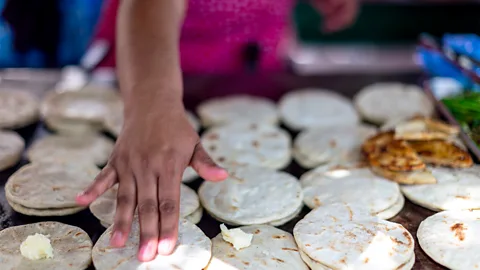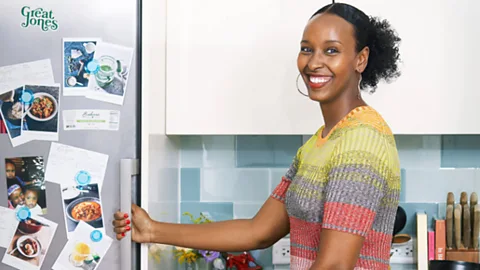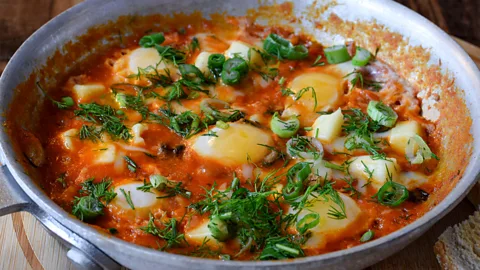'Food is the thing that grounds them': What happens to family recipes when home no longer exists?
 Getty Images
Getty ImagesIn her new book, Chef Hawa Hassan shares dishes and stories from conflict zones, showing how food can preserve culture, even when so much else is lost.
When Ali Zaman makes Uzbeki Kabuli pulao – Afghanistan's national rice and lamb dish – he always adds a splash of toasted sesame oil to enhance the flavour. The New York City coffee-shop owner, whose roots stretch from Queens to Kabul and Maimana, is passionate about sharing the flavours of his heritage. "Home isn't merely a place on the map," he is quoted as saying in Setting a Place for Us, the new book by James Beard Award-winning chef Hawa Hassan. "It's a feeling that transcends borders."
That sentiment flows through every page of Hassan's latest work, which explores the powerful connection between food, identity and displacement. Echoing the format of her acclaimed debut In Bibi's Kitchen, this latest collection combines history, personal stories and traditional recipes from eight countries affected by conflict and displacement, including Yemen, El Salvador, Lebanon and the Democratic Republic of Congo.
From the poignant account of a Baghdadi brewer who had to flee his home twice to a recipe for the intoxicating flavours of Egyptian fil fil mahshi (stuffed peppers), the book chronicles the stories and dishes people carry with them when war, disaster or exile forces them to leave everything else behind, while exploring the larger question of how food helps ground people in times of trouble.
BBC Travel spoke to the Somali-American chef and author about documenting diaspora through food, what she learned from the people she interviewed and what it means to set a place at the table for cultures often left out of the story.
 Kyoto Hamada
Kyoto HamadaThere are now so many places around the world where people have been displaced through conflict and disaster. How did you choose which places to represent in the book?
I always tell people that I picked them because I also wanted to examine my own story and what that looked like, but the truth is that I chose these countries based on conflict and instability, humanitarian concern, and then, lastly, historical and cultural significance. Despite their struggles, these nations hold such deep-rooted parts of our own history. I wanted to talk about the cradle of civilisation in Iraq; I wanted to talk about trade in Lebanon; I wanted to talk about ancient Egypt. When we think about displacement and war, oftentimes it becomes the single story as opposed to the full story of a place.
Each recipe is paired with a personal story. Why was it important to put faces and names to these dishes?
That was the framework that I used in Bibi's Kitchen, bringing people in and saying: "It's stories and recipes from grandmothers on the Indian Ocean." The same is true here: [when you] put a name on the recipe, put a face on it, it makes it real, brings it to life [and] makes it tangible. I think people are interested in other people. I think that's always been the framework for me. People first, food second. Stories [come] first.
More like this:
• The flawless biscuit that took years to master
Can you share a favourite story from the book?
There isn't just one powerful story – everyone I spoke to shared something meaningful and full of impact. I hope the overall breadth of the book is what readers find powerful. It's the collective weight of these voices that tells the real story. The communities in this book show us what it looks like to carry home with you, even when you've been uprooted. That spirit is what's most important and inspiring.
How did the people you interviewed respond when you asked them to share their stories and recipes?
Tenderly. There was laughter, some tears and always, always a deep sense of pride.
Why do you think food holds identity so powerfully, especially in times of displacement?
I got into food shortly after reuniting with my family, after 15 years of being apart. I started to question all that I had erased or tried to erase. I think in order for me to have got to the point where I am now, it was really important for me to understand where I came from. So I think sometimes food can provide a calling back of sorts to where we're from, or even sometimes give direction for where we're going.
The thing that I've come to understand is that [food is] sensory. A smell can place you in a whole different time in your life. A taste can place you at a whole different place. And I think that it's common: no matter who you are or where you are, you have to eat.
When I was thinking about this book, [someone] said to me: "I don't think people care about food when there's bombs going off over their heads." And I was like… "Actually, food is the thing that grounds them."
 Alamy
AlamyWhy was it important for you to tell stories of immigration and displacement, especially right now?
Somebody needs to keep a record. Not just one person, but many people need to tell their stories as loud as possible so that the people in charge do not silence us into fear or into being othered.
More than ever, we need stories, we need storytellers, we need people who keep cultures intact. We need chefs; we need home cooks. I don't care if your way of being proactive in these times is just cooking a meal for a bunch of people who are trying to figure out the solution. I think more than ever, it's important to be at the table. And even if you don't know what the story is, listen to the other people who have a story to share.
What do you hope readers will take away from Setting a Place for Us?
I hope they come away with a deeper respect for the quiet, everyday ways people preserve culture. That they see how food is never just food – it's memory, identity and survival. This book isn't just a collection of recipes; it's a chorus of voices that have too often been left out of the story. My hope is that readers will cook these dishes, share them, and in doing so, make room at the table for all of us.
--
If you liked this story, sign up for The Essential List newsletter – a handpicked selection of features, videos and can't-miss news, delivered to your inbox twice a week.
For more Travel stories from the BBC, follow us on Facebook, X and Instagram.
